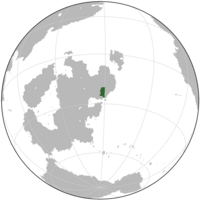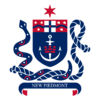New Piedmont: Difference between revisions
No edit summary |
No edit summary |
||
| Line 1: | Line 1: | ||
{{Infobox country | {{Infobox country | ||
| conventional_long_name = United | | conventional_long_name = United Commonwealths of New Piedmont | ||
| common_name = New Piedmont | | common_name = New Piedmont | ||
| native_name = {{collapsible list | | native_name = {{collapsible list | ||
| Line 13: | Line 13: | ||
| rowclass2 = mergedrow | | rowclass2 = mergedrow | ||
| label2 = [[Fluvan Language|Fluvan]] | | label2 = [[Fluvan Language|Fluvan]] | ||
| data2 = Jünaitöd | | data2 = Jünaitöd Kamönwälths uv Nuu Peedmont ([[Piedmontese Fluvan#Alphabet|Piedmontese alphabet]]) | ||
| rowclass3 = mergedrow | | rowclass3 = mergedrow | ||
| label3 = {{wp|Luxembourgish|Piedmontese}} | | label3 = {{wp|Luxembourgish|Piedmontese}} | ||
| Line 152: | Line 152: | ||
}} | }} | ||
'''New Piedmont''', officially the '''United | '''New Piedmont''', officially the '''United Commonwealths of New Piedmont''', is a country in Northern Galia, situated along the southeast coast of the Yawatha region. New Piedmont is bordered by [[Temelaeli]] to the north, [[Iodaia]] to the east, and [[Janolia]] and [[Louisianian Republic|Louisiana]] to the west. To the south lies the [[Naossian Gulf]], and the country shares maritime borders with [[Naossia]]. The country's capital is the inland city of [[Williamstown]], but the largest city is the port of [[New Oshkosh]]. Other major cities include [[Angel City, New Piedmont|Angel City]], [[Jacksonville, New Piedmont|Jacksonville]], and [[Kexem]]. | ||
The areas which are now New Piedmont were the last large habitable swaths of land to be settled by foreign colonies in Galia. In 1642, the Alaoyian explorer [[Abel Tasmanen]] became the first non-native to sight and record New Piedmont. Colonists, primarily [[Bergwiesers]] from [[Fluvannia]], began arriving in the late 1700s and early 1800s, often pushing native populations out. Other Fluvan colonists, [[Gagians]], and [[Iodaian Jewish|Iodaians]] arrived during this period. New Piedmont was confederated in 1919 and became fully independent in 1953, becoming an independent republic. New Piedmont escaped direct damage to its territory in the [[Second Great War]], but did suffer from missile and bomber strikes during the [[Third Great War]]. After the Third Great War, New Piedmont [[Partition of Semhara|partitioned Semhara]] with Iodaia and Louisiana. In contrast to its neighbors, New Piedmont has fully integrated much of its Semharan territory. | The areas which are now New Piedmont were the last large habitable swaths of land to be settled by foreign colonies in Galia. In 1642, the Alaoyian explorer [[Abel Tasmanen]] became the first non-native to sight and record New Piedmont. Colonists, primarily [[Bergwiesers]] from [[Fluvannia]], began arriving in the late 1700s and early 1800s, often pushing native populations out. Other Fluvan colonists, [[Gagians]], and [[Iodaian Jewish|Iodaians]] arrived during this period. New Piedmont was confederated in 1919 and became fully independent in 1953, becoming an independent republic. New Piedmont escaped direct damage to its territory in the [[Second Great War]], but did suffer from missile and bomber strikes during the [[Third Great War]]. After the Third Great War, New Piedmont [[Partition of Semhara|partitioned Semhara]] with Iodaia and Louisiana. In contrast to its neighbors, New Piedmont has fully integrated much of its Semharan territory. | ||
| Line 158: | Line 158: | ||
Today, the majority of New Piedmont's population is of Fluvannian descent, with native Galians being the largest minority, followed by Gagians and Jewish people. This ethnic and lingual heritage has made New Piedmont one of the most diverse countries on the planet, with twelve languages having more than 100,000 native speakers in New Piedmont, with eight of them having some official status in the country. The largest native language is Bergwieser, but Fluvan is understood by most people and in urban areas, serving as a common language for most of the country. A unique aspect of the [[Piedmontese Dialect of Fluvan|Piedmontese dialect]] is the [[Piedmontese Fluvan Alphabet|unique alphabet]] adopted in 1883. The alphabet is a simplified one of standard Fluvan and is entirely phonetic. | Today, the majority of New Piedmont's population is of Fluvannian descent, with native Galians being the largest minority, followed by Gagians and Jewish people. This ethnic and lingual heritage has made New Piedmont one of the most diverse countries on the planet, with twelve languages having more than 100,000 native speakers in New Piedmont, with eight of them having some official status in the country. The largest native language is Bergwieser, but Fluvan is understood by most people and in urban areas, serving as a common language for most of the country. A unique aspect of the [[Piedmontese Dialect of Fluvan|Piedmontese dialect]] is the [[Piedmontese Fluvan Alphabet|unique alphabet]] adopted in 1883. The alphabet is a simplified one of standard Fluvan and is entirely phonetic. | ||
New Piedmont is a democratic and developed country with an advanced high-income economy. While its economy is the eighth largest in the region | New Piedmont is a democratic and developed country with an advanced high-income economy. While its economy is the eighth largest in the region, its GDP per capita is third. A founding member of the [[Global Community]], New Piedmont was the third member to join the [[North Galian Union]] and is one of three [[Shekel States (NGU)|Shekel States]], alongside Iodaia and Louisiana, and the [[Trans-Galian Partnership]]. It is also a member of numerous other international institutions, including the [[Galian Entente]]. New Piedmont has a unique cultural heritage, large tourism industry, and prominent shipping sector. The country's rich historical legacy is reflected in part by its many heritage sites and high diversity. | ||
{{Manala topics}} | {{Manala topics}} | ||
Revision as of 05:47, 11 November 2023
United Commonwealths of New Piedmont 3 official names
| |||||||
|---|---|---|---|---|---|---|---|
| Anthem: Hail the Red Flag! | |||||||
 | |||||||
| Capital | New Oshkosh | ||||||
| Largest city | Williamstown | ||||||
| Official languages | Burgwieser Fluvan Piedmontese | ||||||
| Recognised national languages | Autonomous Regional Languages Vinn Burgwieser Louisiana Creole Umitaku Yudipraha Nonautonomous Regional Languages Semharan An-Naas Yawathan Qalawena Odehen | ||||||
| Ethnic groups (2022) |
| ||||||
| Religion (2020) |
| ||||||
| Demonym(s) | New Piedmontese | ||||||
| Government | Federal semi-presidential republic | ||||||
| Paul Bettel | |||||||
| Jakob Fumori | |||||||
| Olaf Biskel | |||||||
| Sabine Esser | |||||||
| Legislature | Union Parliament | ||||||
| Independence from Fluvannia | |||||||
| Summer 1801 | |||||||
| 1 December 1919 | |||||||
• Independence from Fluvannia | 29 August 1953 | ||||||
| 1985 | |||||||
| Area | |||||||
• Total | 182,056 km2 (70,292 sq mi) | ||||||
| Population | |||||||
• 2022 estimate | 7,850,000 | ||||||
• 2013 census | 7,841,110 | ||||||
• Density | 43.07/km2 (111.6/sq mi) | ||||||
| GDP (nominal) | 2022 estimate | ||||||
• Total | |||||||
• Per capita | |||||||
| Gini (2022) | low | ||||||
| HDI (2022) | very high | ||||||
| Currency | Galian Shekel ($) (NGS) | ||||||
| Date format | mm-dd-yyyy | ||||||
| Driving side | right | ||||||
| Calling code | +911 | ||||||
| ISO 3166 code | AL | ||||||
| Internet TLD | .np | ||||||
New Piedmont, officially the United Commonwealths of New Piedmont, is a country in Northern Galia, situated along the southeast coast of the Yawatha region. New Piedmont is bordered by Temelaeli to the north, Iodaia to the east, and Janolia and Louisiana to the west. To the south lies the Naossian Gulf, and the country shares maritime borders with Naossia. The country's capital is the inland city of Williamstown, but the largest city is the port of New Oshkosh. Other major cities include Angel City, Jacksonville, and Kexem.
The areas which are now New Piedmont were the last large habitable swaths of land to be settled by foreign colonies in Galia. In 1642, the Alaoyian explorer Abel Tasmanen became the first non-native to sight and record New Piedmont. Colonists, primarily Bergwiesers from Fluvannia, began arriving in the late 1700s and early 1800s, often pushing native populations out. Other Fluvan colonists, Gagians, and Iodaians arrived during this period. New Piedmont was confederated in 1919 and became fully independent in 1953, becoming an independent republic. New Piedmont escaped direct damage to its territory in the Second Great War, but did suffer from missile and bomber strikes during the Third Great War. After the Third Great War, New Piedmont partitioned Semhara with Iodaia and Louisiana. In contrast to its neighbors, New Piedmont has fully integrated much of its Semharan territory.
Today, the majority of New Piedmont's population is of Fluvannian descent, with native Galians being the largest minority, followed by Gagians and Jewish people. This ethnic and lingual heritage has made New Piedmont one of the most diverse countries on the planet, with twelve languages having more than 100,000 native speakers in New Piedmont, with eight of them having some official status in the country. The largest native language is Bergwieser, but Fluvan is understood by most people and in urban areas, serving as a common language for most of the country. A unique aspect of the Piedmontese dialect is the unique alphabet adopted in 1883. The alphabet is a simplified one of standard Fluvan and is entirely phonetic.
New Piedmont is a democratic and developed country with an advanced high-income economy. While its economy is the eighth largest in the region, its GDP per capita is third. A founding member of the Global Community, New Piedmont was the third member to join the North Galian Union and is one of three Shekel States, alongside Iodaia and Louisiana, and the Trans-Galian Partnership. It is also a member of numerous other international institutions, including the Galian Entente. New Piedmont has a unique cultural heritage, large tourism industry, and prominent shipping sector. The country's rich historical legacy is reflected in part by its many heritage sites and high diversity.

